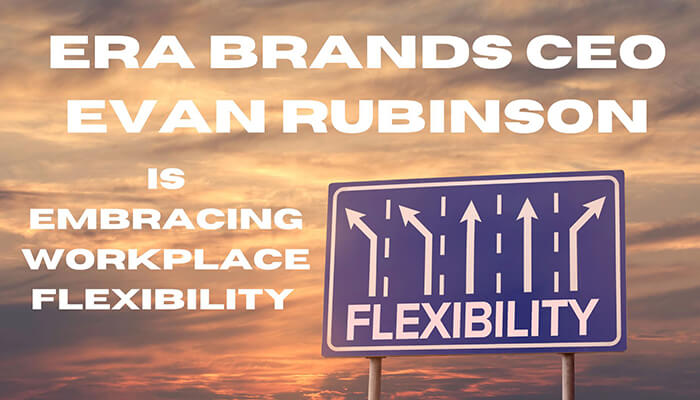Workplace flexibility, sometimes called business agility, is the concept of adapting to changing situations, conditions, or jobs. It’s becoming more crucial as businesses weather new challenges and technologies. To better understand what workplace flexibility is and how to develop it, we spoke with someone who embodies the theory: Evan Rubinson, CEO of ERA Brands.
Before launching his current music conglomerate, Evan Rubinson worked in finance, led a musical instrument company, and oversaw a hedge fund. His ability to find success across multiple sectors and industries positions him as a living proof of concept for business flexibility.
“Flexibility is not something I ever consciously thought about,” he said. “For me, I always just put my head down and went to work. It may have to do with my own personality, but I like to be very hands-on.
I like to get involved in every part of the business, which is probably how I developed the ability to be flexible. If you want to have a hand in everything that’s going on and get to know each branch of your company, you have to build an understanding of all the moving parts. So, in that way, flexibility came naturally to me.”
One of the biggest struggles of workplace flexibility concerns employees — how they work, when they work, and where they work.
Rubinson went straight to Wall Street after graduating from Duke University. After two years trading a closed-end equity fund, he realized he had a knack for the business and opened his hedge fund.
“At that point, I got a call from my father, and he was down in Florida. He said, ‘Look, I have a pretty bad illness. I’m going to the hospital. I don’t know exactly what it is, but I got lost on my way to work, at the same place I’ve worked at for 20 years.
I couldn’t figure out how to drive there. I had to park my car and get an ambulance, take me to the hospital.’ And so I came home,” Rubinson said.
The plan wasn’t to shutter the hedge fund, which was doing well and on track for high growth. But Rubinson’s father got more bad news. The diagnosis came back as malignant brain cancer.
“My father said, ‘I want you to quit the finance job stuff, and I want you to come back and take over my musical instrument company because I don’t know who else would,’ and he sounded a bit panicked,” Rubinson recalled.
“Family means a lot to me, and the opportunity to take over my father’s legacy was very important, so I never had anything but a convicted attitude toward coming home and shutting down the hedge fund. To me, it was a natural decision, but maybe not a business decision.”
A year later, Rubinson’s father passed away, leaving him in charge of the business.
“It was a very different animal, moving from the buttoned-up world of finance to the more laid-back world of music,” he said. “I quickly learned these people operate differently, and it’s not necessarily a bad thing. I had to take a step back and learn a new management style that worked for each person. I couldn’t rely on an objective standard.”
That kind of thinking goes against some of the most ingrained aspects of management literature, which is precisely why it works, he said.
The traditional model of employee management held that everyone should be treated identically, but Rubinson found that treating each employee as an individual produced better results.
“I think one of the biggest things that I had to learn was, hey, sometimes a guy doesn’t show up to the office, and I get upset because I need them for something, but then I find out later that night that they’re hanging out with some famous artists at a bar, and he got a guitar into their hands,” he said “Now, a guy with a million followers that plays in massive stadiums has our guitar that he’s playing and advertising.”
This kind of unique result only happens when an employee has the flexibility to accomplish their goals in unconventional ways, and management has the flexibility of mind to allow it, he said.



